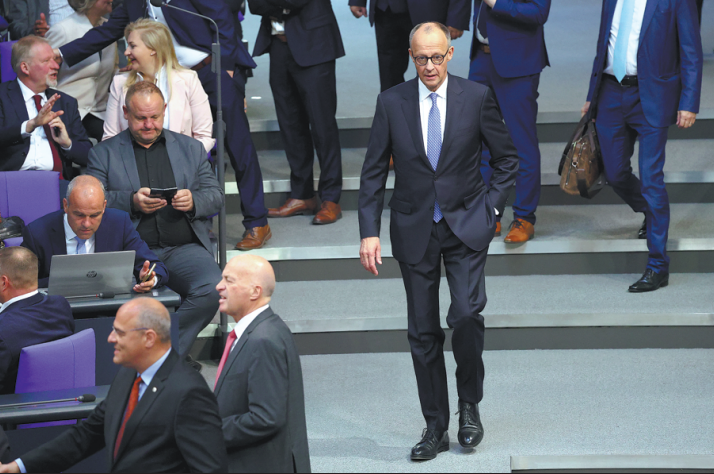Germany's Merz elected chancellor after setback
Christian Democratic leader secures win after surprising loss in first vote


The man who won Germany's federal election in February and who spent the following weeks building a potential ruling coalition was finally elected chancellor on Tuesday, after a last-minute hitch threatened to derail his plans.
Friedrich Merz, leader of the conservative Christian Democratic Union, or CDU, had been building a political alliance with the center-left Social Democratic Party ever since the election. It was to have been an alliance capable of giving him the votes he needed to run the country smoothly through a coalition government.
However, in an unexpected twist, despite the two parties signing a coalition deal on Monday, Merz initially fell short of the support he needed in a parliamentary vote that was supposed to have been a formality and end with him being named chancellor of Europe's largest economy.
As he signed the coalition deal, Merz acknowledged the two parties do not see eye-to-eye on everything, but said, "It's our historical duty to make this government a success."
The coalition should have given Merz a 12-seat majority in parliament, but some lawmakers did not vote as they were expected to during the first round and, needing 316 votes from the 630-seat parliament, Merz initially mustered only 310.
The six-vote defeat in the secret ballot looked to have been attributed to opposition from Social Democrats who disapproved of the alliance with the CDU.
The drama was soon resolved, with a rerun of the vote in the afternoon in which Merz received 325 votes with a majority of nine.
German President Frank-Walter Steinmeier later appointed Merz as chancellor, officially marking the start of his time in office.
After confusion
The second vote was held after apparent confusion and shock in Germany's parliament.
"The world is in turmoil. Europe needs a strong Germany," Carsten Linnemann, secretary-general of the CDU, told reporters after Merz's loss. He said a second vote should come soon. "We can't wait for days now, we need clarity quickly."
Upon announcing the second vote, the head of the Union bloc in parliament, Jens Spahn, said, "The whole of Europe, perhaps even the whole world, is watching this second round of elections."
Tuesday's initial defeat was seen as a massive embarrassment to Merz and a huge disappointment for the CDU, which had campaigned on being a strong alternative to the previous administration led by Olaf Scholz, which collapsed because of infighting late last year.
The far-right Alternative for Germany, or AfD, which scored a record result of more than 20 percent in February's election, cheered the surprise initial result. It had previously said the proposed two-party coalition should never be allowed to run the country.
"Merz should step aside and the way should be cleared for a general election," AfD co-leader Alice Weidel said earlier, calling the first-round result a "good day for Germany".
The CDU won the federal election with 28.5 percent of the vote and needs the support of at least one other party to form a government. The Social Democratic Party secured 16.4 percent, its poorest performance since World War II.
The two parties' struggles come as the anti-immigrant AfD is growing quickly in popularity and threatening to soon be in a position to lead the country.
The CDU has promised increased border security in an effort to hold the AfD at bay, and has said it will oversee an economic revival once it is in government and committed to a big increase in military spending.
Agencies contributed to this story.


































